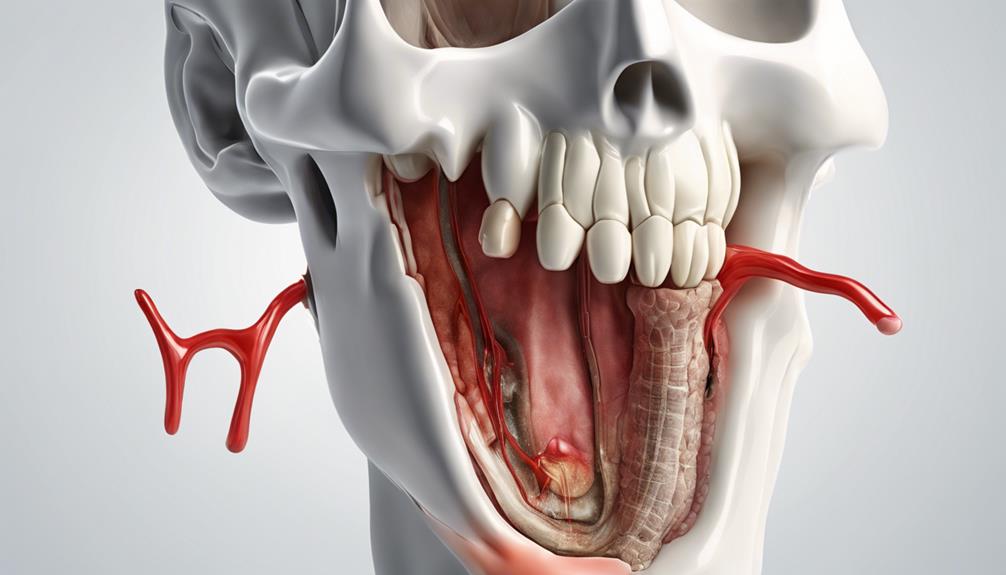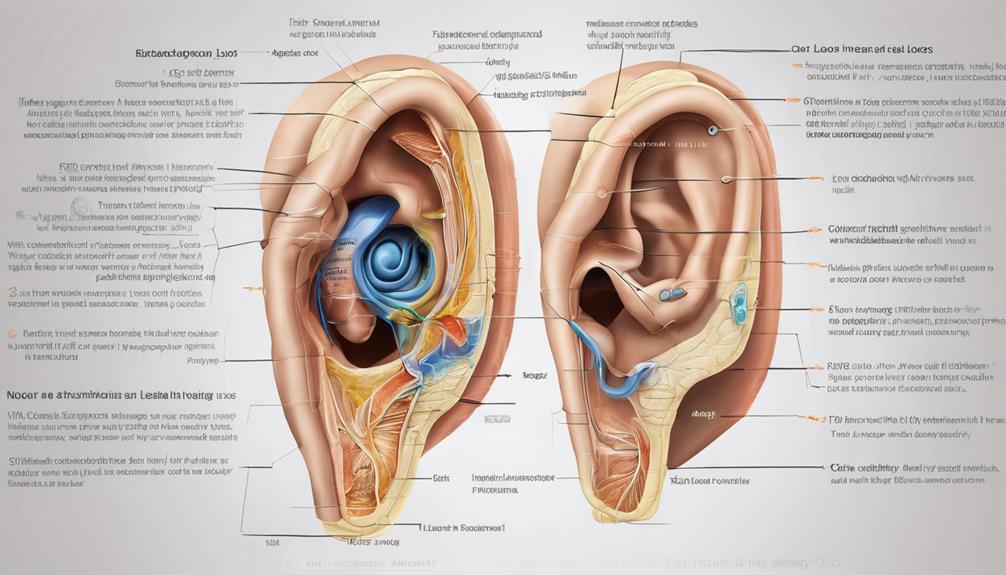Upon initial examination, the correlation between dental infections and impaired hearing may seem unconnected, but further exploration of the relationship reveals it is worth examining.
Understanding how a simple dental issue can potentially impact our hearing abilities sheds light on the importance of holistic health care practices.
By unraveling the mechanisms behind this connection, we can uncover valuable insights that could potentially transform the way we perceive oral and auditory health intertwined.
Key Takeaways
- Dental infections can lead to inner ear inflammation, impacting blood flow and causing hearing issues.
- Early recognition and treatment of dental problems are crucial to prevent irreversible hearing loss.
- Prompt management of tooth infections through antibiotics or root canal therapy can preserve hearing abilities.
- Understanding the connection between dental issues and hearing loss emphasizes the importance of holistic healthcare.
Dental Infections and Hearing Loss Link
Dental infections may cause inflammation that hampers blood flow to the inner ear, potentially leading to hearing loss. When bacteria from infected teeth spread to the inner ear, they can disrupt its delicate mechanisms, contributing to various hearing issues.
Inflammation within the inner ear, triggered by dental infections, can manifest as symptoms like dizziness, vertigo, tinnitus, and ultimately, hearing loss. This connection highlights the intricate relationship between oral health and auditory function.
Timely intervention is crucial in managing dental infections to prevent complications that could significantly impact hearing. By prioritizing good oral hygiene practices and promptly addressing any dental concerns, individuals can mitigate the risk of experiencing hearing loss associated with tooth infections.
Understanding and addressing the link between dental infections and hearing loss underscores the importance of comprehensive healthcare that considers the interconnectedness of the body's systems.
Inner Ear Impact of Tooth Infections

In cases of tooth infections, the intricate nerve pathways can serve as conduits for bacteria to reach and disrupt the delicate balance of the inner ear. When bacteria from an infected tooth spread to the inner ear, it can lead to various complications, including sensorineural hearing loss and other inner ear problems. The connection between tooth infections and inner ear issues is crucial to understand, as it highlights the potential impact on hearing and overall health.
To emphasize the significance of this relationship, consider the following table:
| Tooth Infections and Inner Ear Impact | ||
|---|---|---|
| Complications | Symptoms | Management |
| Sensorineural Hearing Loss | Dizziness | Early Detection |
| Inner Ear Balance Disruption | Vertigo | Prompt Treatment |
| Tinnitus | Hearing Loss | Comprehensive Care |
This table underscores the importance of recognizing the signs of inner ear problems stemming from tooth infections and the necessity of timely intervention to prevent potential long-term consequences. Understanding the intricate connection between dental health and inner ear function is essential for maintaining overall well-being.
Common Dental Issues Causing Hearing Problems
Frequent dental issues can contribute to various hearing problems, highlighting the interconnectedness of oral and auditory health. When dental problems arise, they can originate issues that affect the inner ear, potentially leading to ear discomfort and hearing difficulties.
For instance, infected teeth or gum disease can serve as dental origins for inner ear complications. Bacteria from these dental infections have the ability to travel through the bloodstream and reach the inner ear, causing disruptions in its normal functioning. This intrusion can result in symptoms like dizziness, vertigo, tinnitus, and even hearing loss.
It's essential to address dental problems promptly to prevent the spread of bacteria to the inner ear. By maintaining excellent oral hygiene practices and seeking timely dental care, individuals can reduce the risk of developing dental-related issues that may impact their auditory health. Taking proactive measures to address dental concerns can help safeguard against potential hearing problems caused by untreated dental infections.
Symptoms of Hearing Loss From Dental Infections

Exploring the ramifications of untreated dental issues, symptoms of hearing loss stemming from dental infections manifest in various ways, including ringing in the ears (tinnitus), muffled hearing, and difficulty understanding speech. When dental infections lead to inner ear inflammation, the consequences can extend beyond oral discomfort to impact auditory functions significantly.
Here are some key symptoms of hearing loss from dental infections:
- Ear Pain: Patients may experience sharp or dull pain in the affected ear, indicating a potential connection between dental issues and auditory complications.
- Pressure Sensation: A feeling of fullness or pressure in the ear can accompany hearing loss, signaling underlying problems that require attention.
- Balance Issues: Inner ear inflammation from untreated dental infections can disrupt the delicate balance mechanisms, leading to vertigo and unsteadiness.
- Compromised Auditory Nerve Function: Severe cases may result in compromised auditory nerve function, affecting the transmission of sound signals and potentially causing irreversible hearing loss if left unchecked.
Treatment for Tooth Infections and Hearing Loss
Prompt treatment of tooth infections is crucial in preventing potential hearing loss. This involves targeting the underlying inflammation source effectively. Antibiotics are commonly prescribed to combat bacterial infections from tooth problems, reducing the risk of associated ear pain and hearing complications.
In cases where the infection has reached the tooth pulp, root canal therapy can be highly effective. This treatment involves removing the infected tissue and sealing off the tooth, preventing the spread of bacteria to the inner ear and safeguarding hearing abilities.
In more severe instances, surgical procedures such as tooth extraction may be necessary to halt further complications and preserve hearing. Close monitoring by dental and medical professionals is essential to ensure comprehensive care and minimize the risk of hearing loss associated with tooth infections.
Frequently Asked Questions
Can You Lose Your Hearing From a Tooth Infection?
Yes, we can lose our hearing from a tooth infection. Untreated infections may lead to inflammation affecting blood flow to the inner ear, potentially causing hearing loss.
Bacteria can spread from infected teeth to the inner ear, disrupting its functions and contributing to hearing issues. Prompt dental treatment is crucial to prevent complications, as inner ear problems can manifest as symptoms like tinnitus, vertigo, and gradual hearing impairment.
What Are the Symptoms of a Tooth Infection Spreading to the Body?
When a tooth infection spreads to the body, symptoms like fever, chills, and general malaise may arise. Swelling, redness, and warmth around the tooth are common signs. Pain in the jaw, neck, or ear can indicate spread.
Systemic symptoms such as fatigue, headache, and swollen lymph nodes may accompany severe infections. In rare cases, complications like sepsis or abscesses in distant body parts can occur.
What Happens if Tooth Infection Spreads to Ear?
When a tooth infection spreads to the ear, it can lead to inner ear complications like dizziness, vertigo, tinnitus, and hearing loss. Bacteria from infected teeth can travel through nerve pathways to the inner ear, disrupting its normal functions.
Symptoms may include ear pain, pressure, and changes in hearing sensitivity. Prompt treatment is crucial to prevent the spread of bacteria and potential hearing issues.
Consulting a dentist promptly can address tooth infections before they affect ear health.
How Common Is Sepsis From Tooth Infection?
Sepsis from a tooth infection is incredibly rare but can happen in severe cases. The spread of bacteria from an infected tooth can trigger sepsis, a life-threatening condition due to the body's response to infection.
Proper dental care and prompt treatment of tooth infections are crucial in preventing sepsis. Symptoms of sepsis from a tooth infection may include fever, rapid heart rate, and confusion.
Conclusion
In conclusion, maintaining good oral health isn't only essential for our teeth and gums but also for our hearing. By addressing dental issues promptly and practicing proper oral hygiene, we can prevent potential hearing problems caused by tooth infections.
Remember, a healthy smile leads to healthy ears, highlighting the importance of regular dental check-ups and timely treatment. Let's keep our mouths and ears in top-notch condition for overall well-being.










